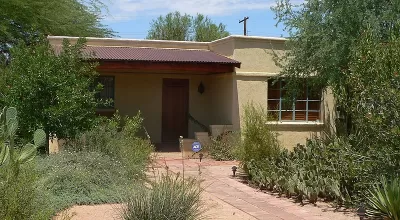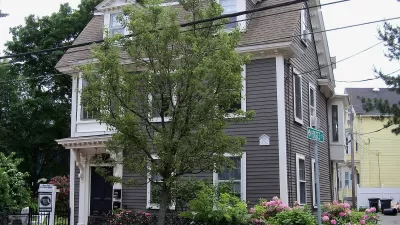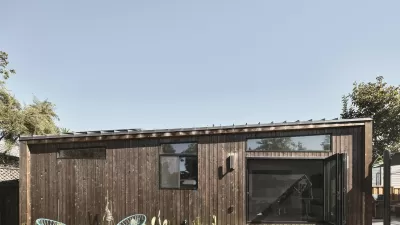Proponents of 'granny flats' say they can alleviate housing shortages and help families keep their homes, but others worry that the programs don't do enough to target low- and middle-income property owners.

In Tucson, as in many smaller cities across the country, housing costs "have risen by nearly 27% over the last year, due in part to low interest rates and a pandemic-inspired influx of transplants from other states." Jessica Kutz reports that as the percentage of housing-burdened residents continues to rise, local leaders are looking to Accessory Dwelling Units (ADUs) as a stopgap for displacement. Often called "casitas," backyard cottages or other types of add-on units can increase housing stock and offer more affordable options for renters.
Like other cities around the country, Tucson recently began the rezoning process to permit and encourage the construction of ADUs.
"But critics say this approach can backfire. In a series of public meetings held in May over Zoom, Tucson residents shared some common concerns. Many fear that ADUs could be converted into short-term rentals like Airbnbs, or that investors will simply purchase the properties in order to turn an even greater profit. Furthermore, ADUs are often too pricey for low-income homeowners to build." Sharayah Jimenez, a local housing activist, believes "the solution is to prioritize low-to-moderate-income residents (earning approximately $51,000 for a family of four) in the rollout of ADU development."
In Denver, Colorado, an ADU pilot program could soon provide a blueprint for how to reach such residents. Run by the West Denver Renaissance Collaborative, which includes the city and county of Denver and the Denver Housing Authority, the initiative has spent the past year assisting low-to-moderate income residents in rapidly gentrifying neighborhoods. The program provides between $50,000 to $75,000 in cost savings to homeowners who build ADUs, along with technical assistance and pre-approved designs. In addition, the city is offering $30,000 loans that do not have to be repaid if the owner agrees to rent the unit at an affordable rate for 25 years.
In Tucson, "It’s already happening informally in the Southside, where a majority of work has been done without permits." Jimenez says that "[r]ather than penalize the new additions, she hopes the city can find ways to promote them by educating current homeowners about their options and empowering families to hold onto their lots in the face of rising property taxes."
FULL STORY: Could casitas help prevent displacement in the West’s cities?

Maui's Vacation Rental Debate Turns Ugly
Verbal attacks, misinformation campaigns and fistfights plague a high-stakes debate to convert thousands of vacation rentals into long-term housing.

Planetizen Federal Action Tracker
A weekly monitor of how Trump’s orders and actions are impacting planners and planning in America.

San Francisco Suspends Traffic Calming Amidst Record Deaths
Citing “a challenging fiscal landscape,” the city will cease the program on the heels of 42 traffic deaths, including 24 pedestrians.

Defunct Pittsburgh Power Plant to Become Residential Tower
A decommissioned steam heat plant will be redeveloped into almost 100 affordable housing units.

Trump Prompts Restructuring of Transportation Research Board in “Unprecedented Overreach”
The TRB has eliminated more than half of its committees including those focused on climate, equity, and cities.

Amtrak Rolls Out New Orleans to Alabama “Mardi Gras” Train
The new service will operate morning and evening departures between Mobile and New Orleans.
Urban Design for Planners 1: Software Tools
This six-course series explores essential urban design concepts using open source software and equips planners with the tools they need to participate fully in the urban design process.
Planning for Universal Design
Learn the tools for implementing Universal Design in planning regulations.
Heyer Gruel & Associates PA
JM Goldson LLC
Custer County Colorado
City of Camden Redevelopment Agency
City of Astoria
Transportation Research & Education Center (TREC) at Portland State University
Jefferson Parish Government
Camden Redevelopment Agency
City of Claremont





























